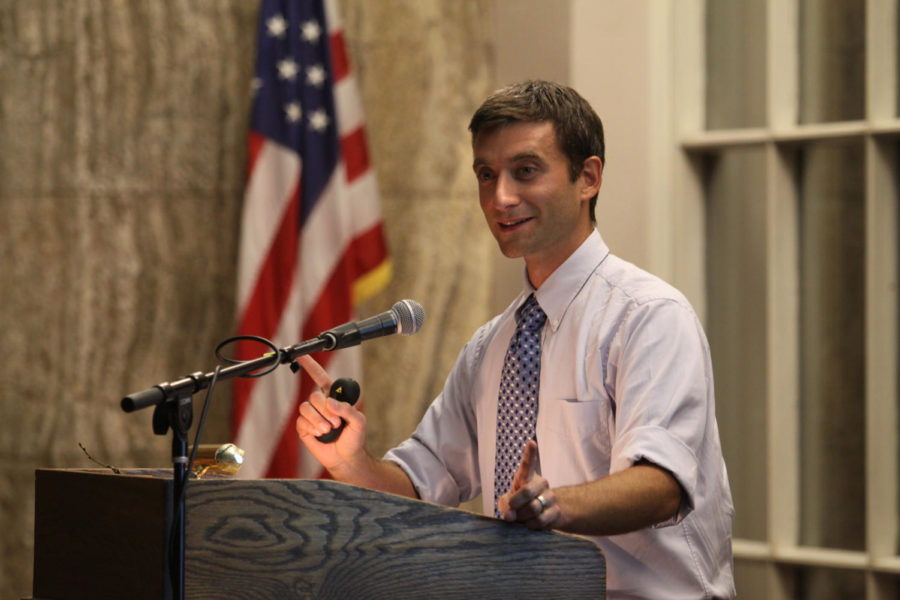Summer science communication symposium focuses on trust and credibility
Photo: Dong Ding/ Iowa State Daily
Michael Dahlstrom, assistant professor of journalism and communication, gives a speech about his research. Faculty members from the College of Liberal Arts and Sciences joined together to celebrate National Arts and Humanities Month on Monday, Oct. 22, in the Campanile Room of the Memorial Union.
June 1, 2018
Academics from a variety of fields across the nation are coming to Ames today to partake in Iowa State’s sixth Summer Symposium on Science Communication.
The symposium is organized by Iowa State faculty of multiple disciplines and happens about once every other year. This year, the symposium focuses on trust and credibility in science communication.
“Right now there isn’t much focus on earning trust [in the science community],” says Michael Dahlstrom, associate professor in journalism and mass communication at Iowa State and symposium organizer. “Too often there’s this assumption that science is just good enough.”
Dahlstrom received a master’s degree in biophysics from Iowa State in 2004 and went on to earn his PhD in journalism, mass communication and environmental resources from the University of Wisconsin-Madison in 2008.
“Science communication is a sort of marriage between my two academic interests,” Dahlstrom said. “But science communication is interdisciplinary, not one school owns it. People from agricultural and natural resource studies, from English departments and other schools intersect at the symposium and bring diverse ideas that wouldn’t normally meet.”
The symposium occurs over the course of two days-June 8 and 9-in Morrill Hall with a registration period on June 7 from 6 p.m. to 8 p.m. in Curtiss Hall. Anyone can come to see the keynote speaker at 3:45 p.m., but registration to access the rest of the symposium costs $45 for Iowa State participants and $95 for non-Iowa State participants.
A 2017 Pew Research Poll recorded public trust of scientists and found, while trust in medical scientists was high, only 39 percent of American adults trust climate scientists “a lot to give full and accurate information.” Slightly less trusted were scientists who spoke about the health risks involving genetically modified foods, who were polled trusted by 35 percent of American adults.
Climate scientists also face added skepticism from White House. President Trump has referred to climate change as a hoax multiple times on social media and the campaign trail. Scott Pruitt, who Trump appointed to the head the EPA, doesn’t believe human induced carbon emissions affect the earth’s climate.
“We start planning the theme for the symposium around a year in advance, sometimes even longer, so it’s not really a reaction to anything,” Dahlstrom said. “But the theme does fit nicely with today’s political climate.”
The symposium will feature food, guest speakers and presentations from 8 a.m. to 6 p.m. in Morill Hall, and there will be a conference dinner from 6 p.m. to 8 p.m. at Reiman Gardens June 9. For a full schedule of the symposiums events, click here.







